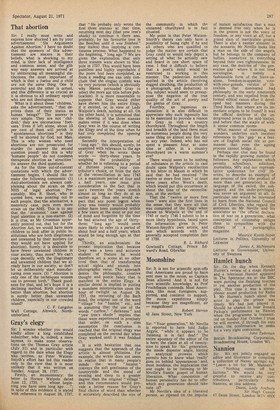Sir: "Your generation," Mr Neville is reported to have told
Judge Argyle, "while it appears to be listening is in fact deaf." The entire apostasy of the editor of Oz is here; the claim at all of twentynine to speak for ' his ' generation, the inside dopester angle, hinting at analytical prowess which permits him to know what 'really' goes on behind 'appearances' and, most insidious, the implication that one ought to be listening to Mr Neville's frantic gospel of human liberation. What conception of human personality has he to offer which any generation should take note of?
Mr Neville's idea of a liberated person, so ripened on the impulse
of instant satisfaction that a man is deemed free only when he is in the groove is not the voice of freedom, or any voice at alt, but a grand slam of inarticulate grunts. There is also a nastier element in the scenario; Mr Neville looks like a man on the side of the angels, but he belongs to the company of bullies, insensitive to everything beyond their own righteousness. In any case, the doctrine of 'the generation gap ' where it is not tired
sociologese, is merely a fashionable form of the leave-usalone, freedom-is-appetite, votewith-your-gonads, version of liberalism that dominated had philosophy in the early nineteenth century, and was expelled from the formal ethical canon after it developed bad manners during the Third Reich. But where are its immediate origins to be found? It was the official doctrine of the underground press in the mid-'sixties, and before that the staple of withit senior common rooms.
What manner of reasoning, one wonders, underlies such insistent references to this 'gap ' as a feature of English social life so permanent that even the ageing process cannot bridge it.
Perhaps one clue may be found in the rapidly growing number of followers. Any explanation which
permits schoolboys, solicitors, journalists, MPs and our representative spokesman for civil liberties, to describe an example of due process of law (the product of more than one generation) in the language of the exiled, the subjugated, and the under-privileged, was never an argument at all. In particular one would be interested to learn from the National Council of Civil Liberties, who regard the sentences on Mr Neville and his associates as 'the official declaration of war on a generation,' what conception of citizenship obliges them to sympathise with the
editors of a pornographic magazine.
Maurice Keens-Soper Lecturer in Politics, University of Leicester James A. McNamara Lecturer in Government, University of Swansea


































 Previous page
Previous page